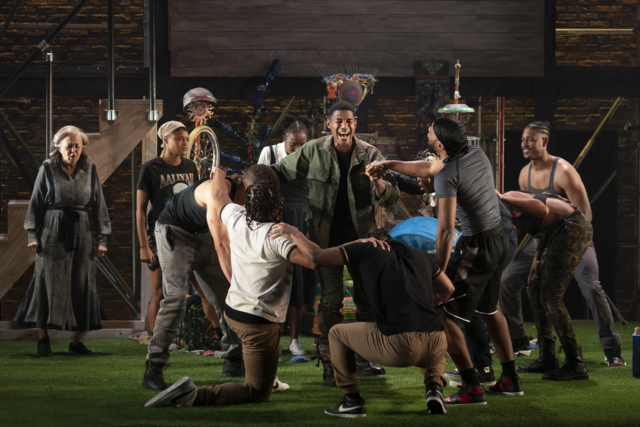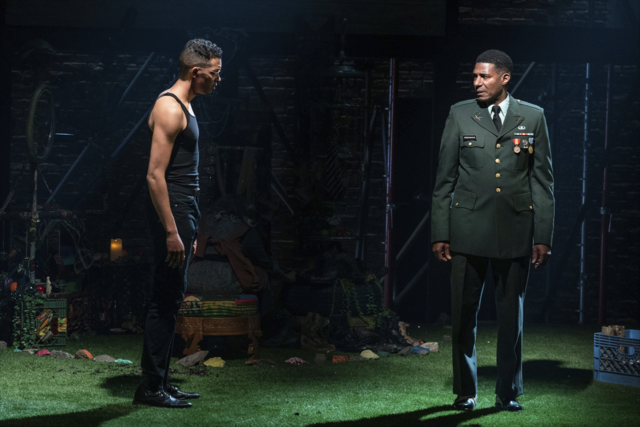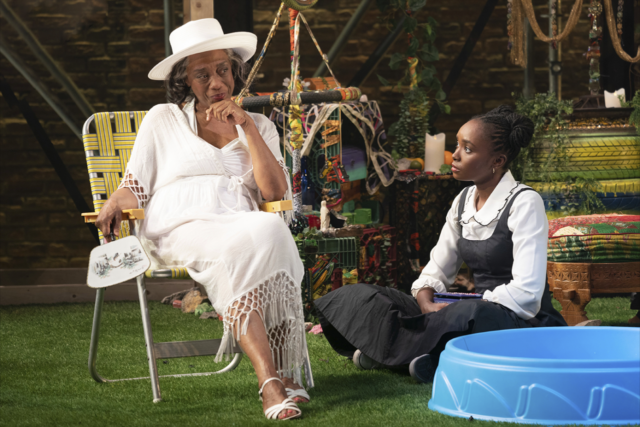
Aleshea Harris’s On Sugarland takes place in a southern cul-de-sac amid wartime (photo by Joan Marcus)
ON SUGARLAND
New York Theatre Workshop
79 East Fourth St. between Second & Third Aves.
Tuesday – Sunday through March 20, $55-$75
www.nytw.org
“We got to holler,” Staff Sergeant Saul Greenwood (Billy Eugene Jones) declares in Aleshea Harris’s electrifying On Sugarland, continuing at New York Theatre Workshop through March 20. He and the Sugarland cul-de-sac of mobile homes, a poor neighborhood trapped inside circular train tracks that promise to take them nowhere, holler in unison to mourn lost members of their community and to honor their ancestors, but the screams resound against generations of socioeconomic injustice and systemic racism emanating from the military industrial complex and its reliance on a fervent nationalism above all else.
Brilliantly filtering Sophocles’s Philoctetes through a bit of Tennessee Williams, Harris tells the vivid, haunting story of the four-hundred-year war fought by Blacks in America for their humanity. The play opens as the people of Sugarland gather to holler for Sergeant Iola Marie Eagle Eye, who the army has finally declared Presumed Killed in Action after her body had gone missing for years. Her fourteen-year-old daughter, Sadie (Kiki Layne), hasn’t spoken in all that time, her voice as well as her mother taken from her, but the narrative is punctuated with her long, poignant monologues to the audience about the matriarchs of her family, generation by generation, back to her great-great-great-grandmother, a freed slave who carried messages to Union soldiers during the Civil War. Each of her stories ends with bloodshed.
Evelyn (Stephanie Berry) and Tisha (Lizan Mitchell) are elderly sisters who can’t stop squawking at each other. Evelyn is like Blanche DuBois, living in a fantasy world; she takes her time overdressing for Iola Marie’s funeral, hoping to attract a suitor. Tisha tends to an outdoor shrine where she collects items from the men, women, and children who have died, paying special attention to her late son’s belongings, which she talks to as if he were there. “It’s time. You’re gonna make us late,” Tisha complains. “The only ‘late’ a lady ever needs to worry about is when her monthly hasn’t shown itself. And since your basement is sealed shut, you good,” Evelyn responds. “When they send you to hell, Ima be in Heaven waiting,” Tisha says.
Saul leads the service in honor of Iola Marie, proclaiming, “We got to holler / They ain’t sent her body home / ’Cause there ain’t nothin left to send / The War has taken the flesh of our dear sister / but the soul is intact / And we are gathered here to reach into / the next world / the world that now holds Iola / We are gathered here to knock on that world’s door / with a singing and a praise / We are gathered here to holler so she can hear us from where she’s at and know that she was loved.” It’s a powerful memorial for all fallen Black people, not just one lost soldier.

Addis (Caleb Eberhardt) and his father, Saul (Billy Eugene Jones), face different kinds of battles in searing new play (photo by Joan Marcus)
But Evelyn is having none of it. “That War can kiss the black off my ass. Fuck that War. Fuck burying boxes. Fuck hollering,” she tells her sister. “I am not cursing the doing of things. I am cursing their necessity. I am cursing the conditions which have led to what have become our customs. Little girls burying boxes for their dead mothers. Our front yard looking like some kind of horrifying carnival graveyard. Calling it Sugarland don’t make it sweet.”
Saul’s seventeen-year-old son, Addis (Caleb Eberhardt), wants to be a warrior like his father; too young and addled for the military, he guards Sugarland as if he were a soldier. He’s in love with Iola Marie’s sister, Odella (Adeola Role), a woman his father’s age. He tells Sadie, “Uh huh Busy being a soldier if you must know I’m already in Junior Cadets Almost Cadet First Sergeant If The War come to this cul-de-sac Ima show out Gon be the last one standing Ima carry the flag and plant that mug on a hilltop They gon make a statue of ya boy Ima be a hero They gon call my name.” Addis regularly shaves his father with a straight razor and helps tend to Saul’s damaged, foul-smelling foot, which oozes blood. Addis wants to join the army, while Saul wants to return to duty, despite his mental and physical injuries.
Meanwhile, the Rowdy (Thomas Walter Booker, Xavier Scott Evans, Mister Fitzgerald, Josh Fulton, Charisma Glasper, Kai Heath, Shemar Yanick Jonas, and Mariyea), a group of eight male, female, and nonbinary teenagers, serve as the Greek chorus, wandering around on the periphery, parading through the space, blasting music, harassing Addis, and commenting on what they’re seeing and occasionally interacting with the others as the biggest holler of all is to come.
On Sugarland is a brilliant, Pulitzer-worthy play deserving of a Broadway transfer and a wide audience. Harris (Is God Is, What to Send Up When It Goes Down), a former spoken-word performer whose mother is a Trinidadian immigrant who spent twenty years in the army, captures the heart and soul of a community too long unheard and unseen. Sadie talks often in her monologues of how her female ancestors were invisible. “White men ain’t in the business of seeing little black girls / you know / we invisible,” she says. Saul says a similar thing about Iola Marie. Their hollers echo through the theater until you can feel it in your bones. Harris makes it clear that a reckoning is coming, so everyone better start opening their eyes and ears. “It was a goddamn beautiful massacre,” Sadie says of an ancestor’s act of vengeance.
Obie-winning director Whitney White (Our Dear Dead Drug Lord, Semblance), who previously collaborated with Harris on the ritualistic healing production What to Send Up When It Goes Down, maintains a furious pace, a relentless assault on the senses that is superbly choreographed by Raja Feather Kelly (Hurricane Diane, The House That Will Not Stand); there is nary a wasted word or movement during the play’s intense and passionate 160 minutes (with intermission).

Evelyn (Stephanie Berry) remembers the past as Sadie (Kiki Layne) listens intently (photo by Joan Marcus)
The play is set in what the German-born, Kentucky-raised Harris describes as “a time of war. yesterday, today, and, unfortunately, tomorrow.” Adam Rigg’s confining set tempts the characters with a potential freedom that seems to always be just out of reach. Qween Jean’s costumes run from elegant to street-savvy, while Mikaal Sulaiman’s sound design and his and Starr Busby’s original music pound and pulsate.
At several points, the recording of a bugle can be heard. The onstage characters stop what they’re doing and salute a nonexistent flag. Despite how this country has treated them and their ancestors over the last four centuries, they still believe in what it has to offer. “Iss all kinda massacres, ain’t it?” Sadie says after a bugle plays the anthem. “All kinds. They got all kinds.”